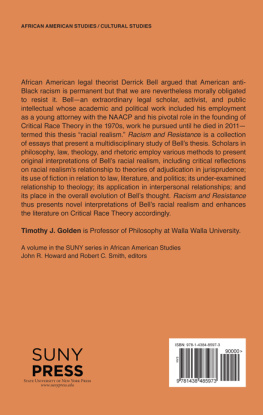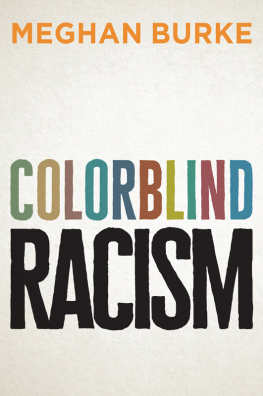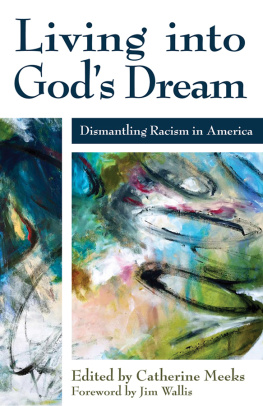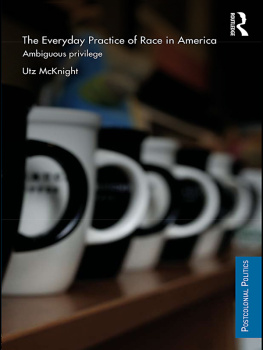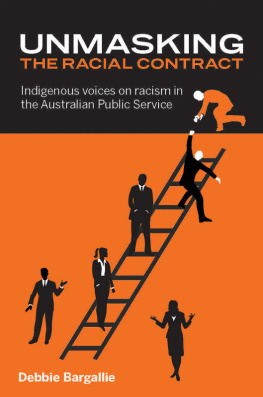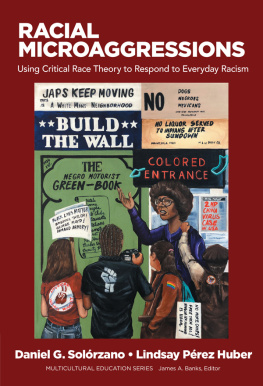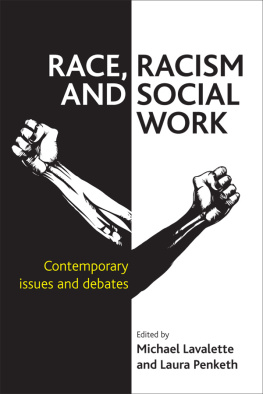Naming Race, Naming Racisms
Defining racism is like nailing jelly to the wall. Eschewing social scientific approaches, which tend to examine race and racism in terms of quasi-static ideal types, this volume surveys differing historical contexts from the advent of scientific racism in the late eighteenth-century to the post-racial racism of the post 9/11 period, and from Europe to the United States, in order to understand how racism has been articulated in differing situations. It is distinguished by the attention it pays to the on-going power of racial discourse in the contemporary period as a legitimating factor in oppression. It exemplifies methodological openness, combining the work of historians, philosophers, political scientists, and literary critics, and includes differing theoretical models in pursuing a critical approach to race: cultural studies; trauma theory and psychoanalysis; critical theory and consideration of the new racism; and postcolonialism and the literature on globalization. It brings together the work of leading academics with younger practitioners and is capped off by an interview with world-renowned intellectual Cornel West on black intellectuals in America.
This book was previously published as a special issue of Patterns of Prejudice.
Jonathan Judaken is an associate professor of intellectual and cultural history at the University of Memphis.
Dedication
To Joelle
Know that the answers make you wise, but the questions make you human
Naming Race, Naming Racisms
Edited by Jonathan Judaken
First published 2009 by Routledge
2 Park Square, Milton Park, Abingdon, Oxon, OX14 4RN
Simultaneously published in the USA and Canada
by Routledge
270 Madison Avenue, New York, NY 10016
Routledge is an imprint of the Taylor & Francis Group, an informa business
2009 Edited by Jonathan Judaken
Typeset in Palatino by Value Chain, India
Printed and bound in Great Britain by MPG Books Group
All rights reserved. No part of this book may be reprinted or reproduced or utilised in any form or by any electronic, mechanical, or other means, now known or hereafter invented, including photocopying and recording, or in any information storage or retrieval system, without permission in writing from the publishers.
British Library Cataloguing in Publication Data
A catalogue record for this book is available from the British Library
ISBN10:0-415-45161-2
ISBN13:978-0-415-45161-1
Table of Contents
Jonathan Judaken
Mark Larrimore
Robert Bernasconi
Richard Francis Crane
Damon Freeman
Leigh Anne Duck
George Michael and D. J. Mulloy
Brigitte Weltman-Aron
Alfred J. Lpez
Jonathan Judaken
Jonathan Judaken and Jennifer Geddes
Robert Bernasconi has been the Moss Professor of Philosophy at the University of Memphis since 1988, and will join Pennsylvania State University in 2009 as the Sparks Professor of Philosophy. He has written extensively on continental philosophy and the critical philosophy of race, and edited numerous books on race, including Race, Hybridity and Miscegenation (Thoemmes 2005). His most recent book is How to Read Sartre (W. W. Norton 2007).
Richard Francis Crane is Professor of History at Greensboro College, Greensboro, North Carolina. He is the author of A French Conscience in Prague: Louis Eugene Faucher and the Abandonment of Czechoslovakia (East European Monographs, 1996), as well as the forthcoming book Passion of Israel: Jacques Maritain, Catholic Conscience, and the Holocaust (University of Scranton Press, 2009).
Leigh Anne Duck is Associate Professor of English at the University of Memphis. She has published articles on American modernism, film and the study of post-plantation literatures in various journals, including the Journal of American Folklore, American Literary History and American Literature. Her book The Nation's Region: Southern Modernism, Segregation, and U.S. Nationalism was published in 2006 by the University of Georgia Press.
Damon Freeman is Assistant Professor in the School of Social Policy and Practice at the University of Pennsylvania, Philadelphia. He is working on a monograph on the life and thought of Kenneth B. Clark entitled Not So Simple Justice: A Biography of Kenneth B. Clark.
Jonathan Judaken is Associate Professor of History and Director of the Marcus W. Orr Center for the Humanities at the University of Memphis. He is the author of Jean-Paul Sartre and the Jewish Question: Anti-antisemitism and the Politics of the French Intellectual (University of Nebraska Press 2006), and editor of Race after Sartre: Anti-racism, Africana Existentialism, Postcolonialism (SUNY Press 2008).
Mark Larrimore is Associate Professor of Religious Studies at Eugene Lang College The New School for Liberal Arts, New York. He is the editor of The Problem of Evil: A Reader (Blackwell 2001) and, most recently, co-editor (with Sara Eigen) of The German Invention of Race (SUNY Press 2006).
Alfred J. Lpez is Associate Professor of English and American Studies at Purdue University in Indiana. He is founding editor of The Global South, an Indiana University Press journal. His most recent book is Jos Marti and the Future of Cuban Nationalism (University Press of Florida 2006). He is also the author of Posts and Pasts: A Theory of Postcolonialism (SUNY Press 2001), and editor of Postcolonial Whiteness: A Critical Reader on Race and Empire (SUNY Press 2005). His works in progress include a trade biography of Jos Marti and a project tentatively entitled The (post)global South.
George Michael is Assistant Professor in the Department of Political Science and Administration of Justice at the University of Virginia's College at Wise, Virginia. He is the author of Confronting Right Wing Extremism and Terrorism in the USA (Routledge 2003) and The Enemy of My Enemy: The Alarming Convergence of Militant Islam and the Extreme Right (University Press of Kansas 2006).
D. J. Mulloy is Associate Professor in the Department of History at Wilfrid Laurier University, Ontario, Canada. He is the editor of Homegrown Revolutionaries: An American Militia Reader (Pen and Inc 1999) and the author of American Extremism: History, Politics and the Militia Movement (Routledge 2004) and Willis Carto and the American Far Right (University Press of Florida 2008).
Brigitte Weltman-Aron is Associate Professor of French in the Department of Romance Languages and Literatures at the University of Florida. She is currently writing a book about Hlne Cixous and Assia Djebar, and her articles on these writers and postcolonial Algeria have appeared in journals such as parallax and Yale French Studies. She has also written several articles on the French eighteenth century and is the author of On Other Grounds: Landscape Gardening and Nationalism in Eighteenth-century England and France (SUNY Press 2001).
The seed for this book began as the first conference of the Scholars in Critical Race Studies group at University of Memphis. While its appearance in print is dramatically different from the original symposium, the spirit that nourishes the group is here contained. For the contributors to this volume are all working at the intersection of theoretical and empirical concerns, which is where the real work in unworking racial matters happens. I am grateful to Robert Bernasconi and Leigh Anne Duck as co-founders of this endeavor, and to Bill Lawson and Leigh Johnson, as well as Daphene McFerren, Director of the Hooks Institute for Social Change, who have all embraced this effort as an ongoing calling. I am also indebted to another colleague, Scott Lerner, who greatly assisted me in the Introduction, conveying what was needed as economically as possible.


